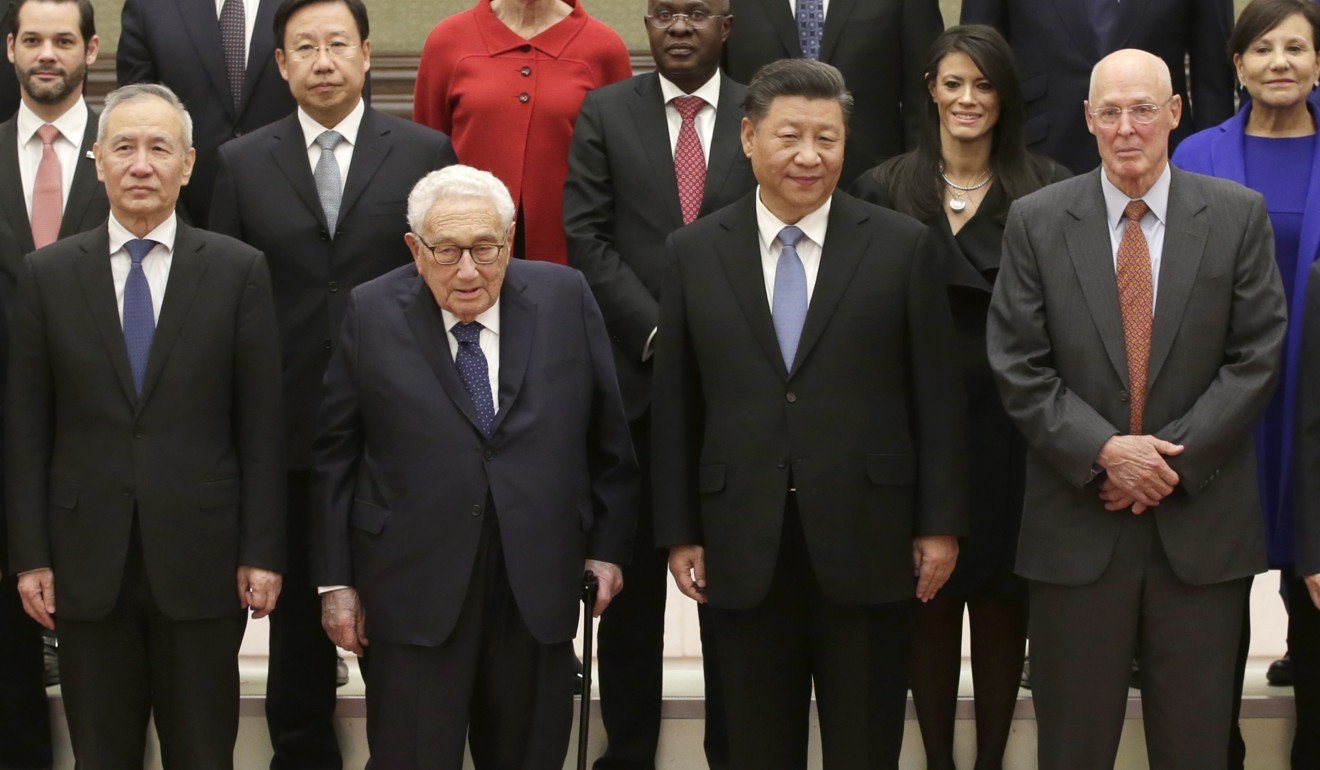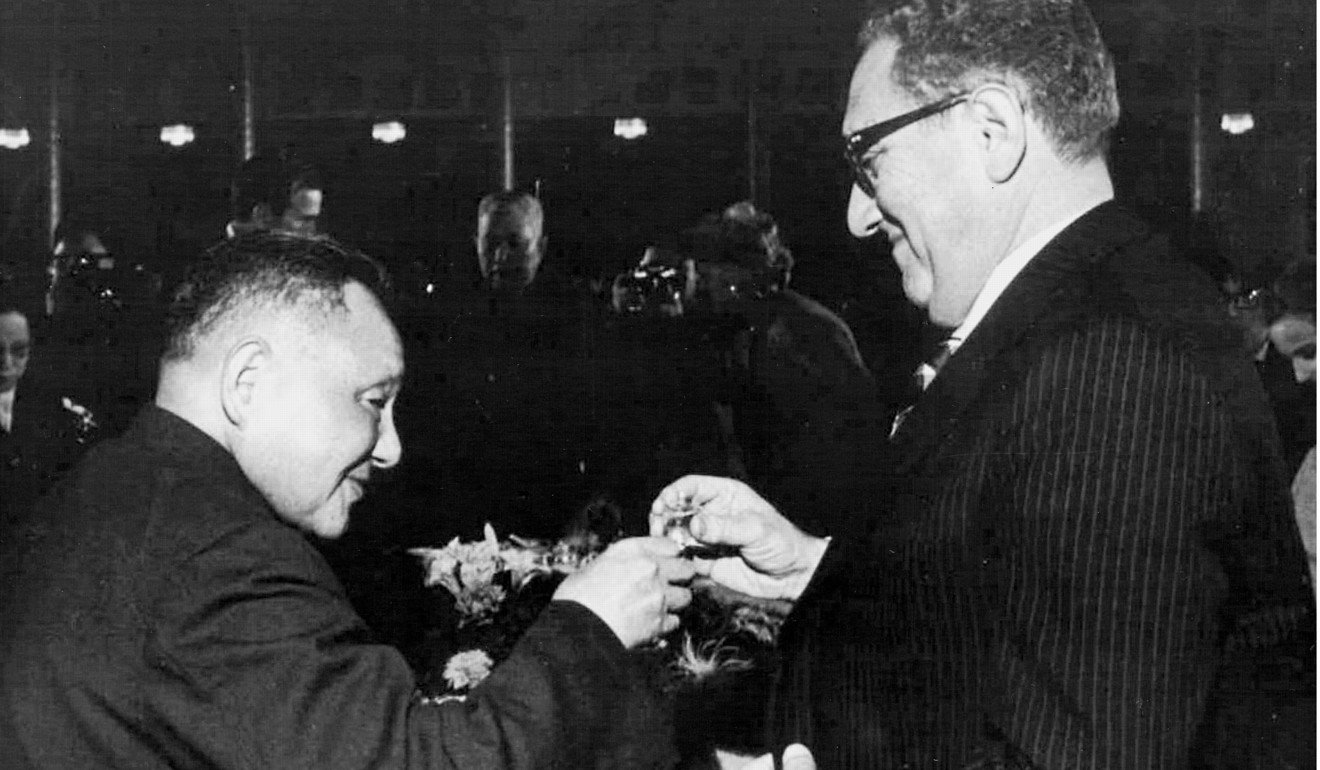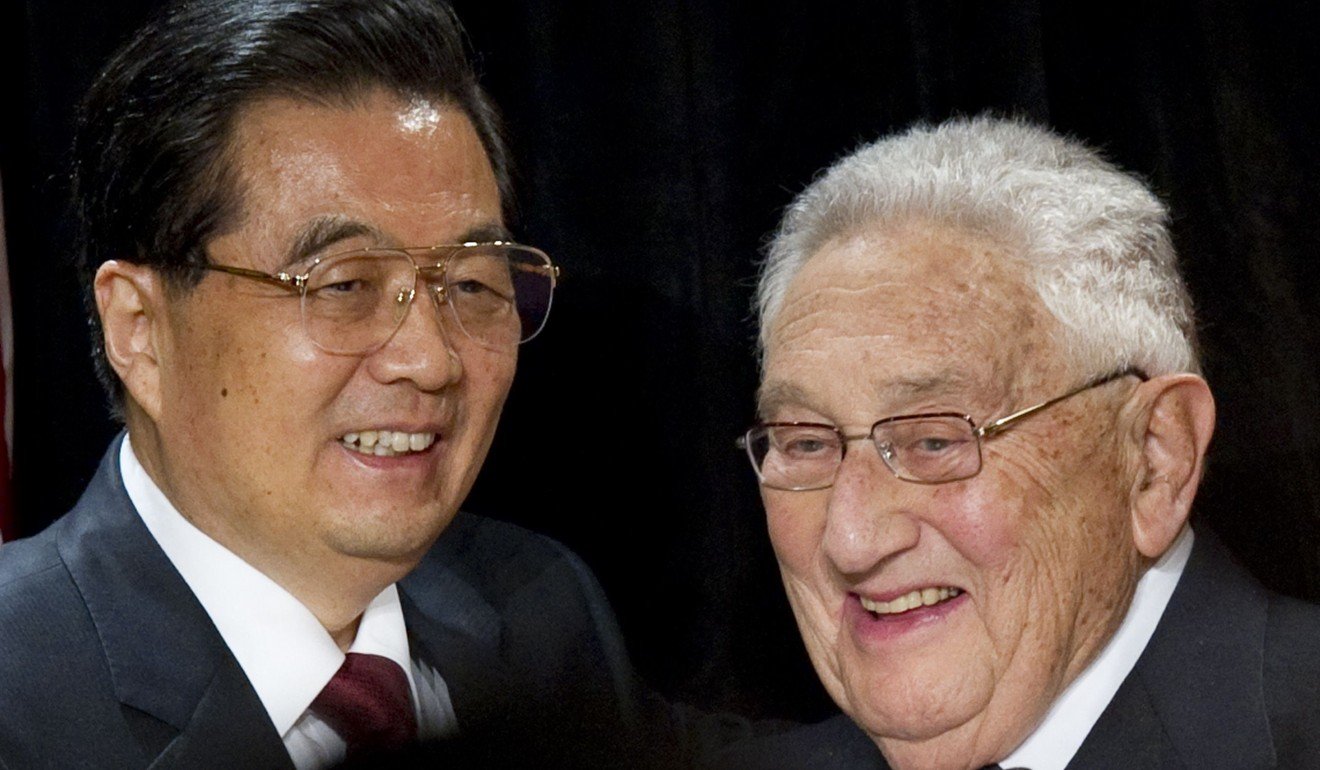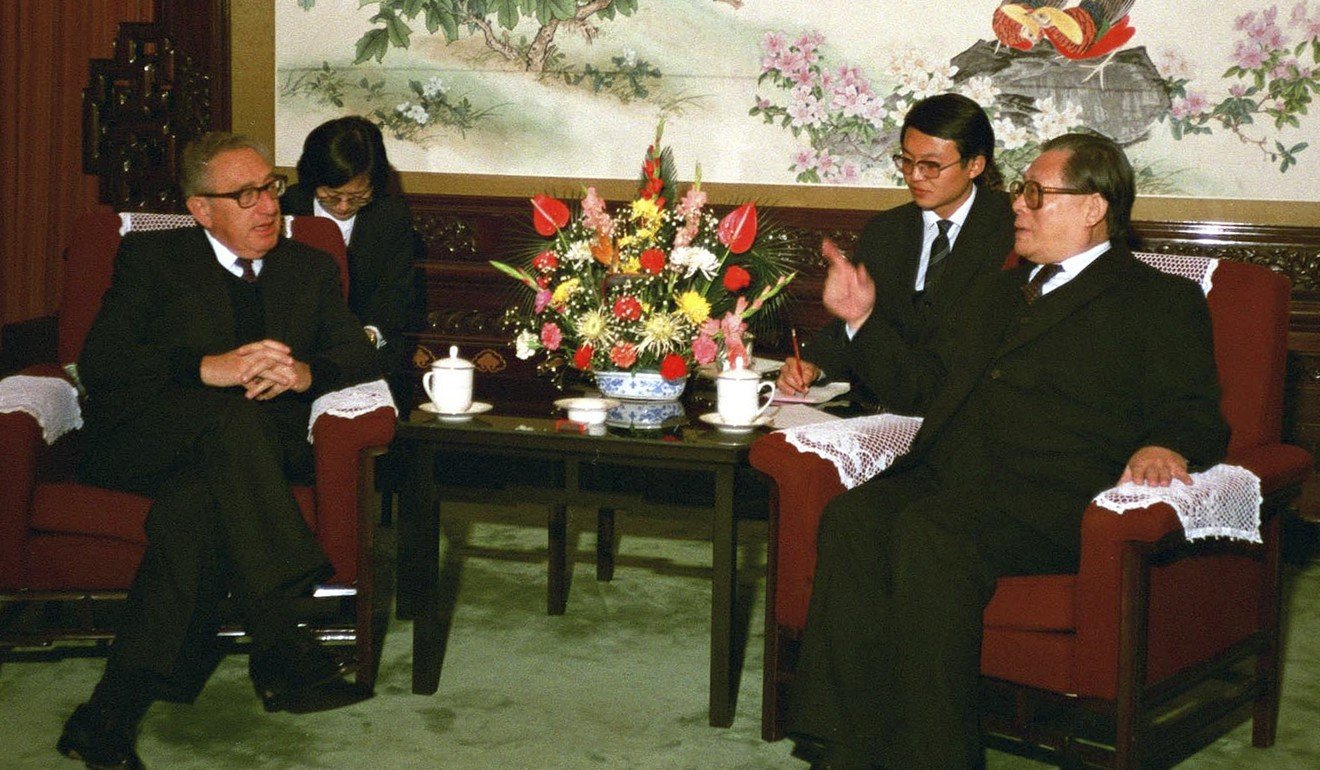
Do China’s cosy meetings with US statesman Henry Kissinger actually do any good?
- Former secretary of state always receives a warm welcome in Beijing, but can he help to bridge the widening gap in China-US ties?
- Analysts say the veteran is great at pointing out problems, but seldom offers any worthwhile solutions
But their clear and cold-eyed analysis of the boiling tensions between the two countries was soon obscured by the rancorous superpower rivalry, which has spilled over from trade and investment into almost every aspect of their relationship.
Ties were “at a critical juncture facing some difficulties and challenges”, Xi was quoted by Xinhua as saying. He urged the two countries to “step up communication on strategic concerns to avoid misjudgment and enhance mutual understanding”.
Xi also praised the veteran US statesman’s “historical contribution” to China-US relations and his “profound historical insights and deep understanding of traditional Chinese culture”.

Kissinger spoke highly of Xi’s message about strengthening communications amid growing signs of confrontation and the decoupling of their economies.
The meeting came as the already fraught US-China relationship was plunged deeper into crisis after US President Donald Trump on Wednesday signed into law bills supporting the pro-democracy protesters in Hong Kong, which had earlier been passed almost unanimously by American lawmakers.
Earlier last week, at the 2019 Bloomberg New Economy Forum in Beijing, the 96-year-old Kissinger warned that the US and China were in the “foothills of a cold war” and that the growing conflict between them, if not restrained, could prove worse than the First World War.
Kissinger, whom Harvard professor Graham Allison described as America’s greatest living statesman, is apparently aware of his importance when he boasted in front of Xi that he had visited China nearly 100 times since his first, secret, trip in 1971.
Few American statesmen have been as revered in China as Kissinger, who over the decades has enjoyed unparalleled access to generations of Chinese leaders, from Mao Zedong, Zhou Enlai and Deng Xiaoping to Jiang Zemin, Hu Jintao and Xi.
Unlike in the US, where he remains a well-respected but largely controversial figure over his realpolitik thinking and his involvement in the Vietnam war and Cambodian civil war, Kissinger has been one of the most reliable American friends to top Communist Party cadres in Beijing.
Xi’s meeting with Kissinger, according to pundits, was clearly a calculated move by Beijing to keep the nations’ deteriorating ties from going off the rails and showcase the significance the Chinese leadership attaches to old friends.
Former Chinese government official Wang Huiyao, who also met the veteran statesman last week, said Kissinger’s close personal ties with Chinese leaders were no coincidence and underscored the overriding significance of China-US relations in Beijing’s diplomatic agenda.
Wang, the founder and president of the Centre for China and Globalisation, a think tank affiliated to the government, said Beijing hoped to rally support from Kissinger and other China-friendly former American officials – like ex-treasury secretary Henry Paulson, who also attended last week’s forum – and others around them.
“Kissinger would not have been treated this way if Beijing did not consider its relations with Washington as most important,” Wang said.
While the message itself was important in the midst of a deepening rift, Gu Su, a political scientist at Nanjing University, said the way in which Beijing sent it was equally intriguing, because Kissinger had once again acted as the messenger.
In the three years since Trump was elected president, Xi has repeatedly sought Kissinger’s advice on how to deal with the unconventional US leader, including a meeting in Beijing in December 2016, just days after Kissinger met the president-elect.
Top Chinese diplomats Yang Jiechi and Wang Yi have also visited Kissinger several times in New York.
Gal Luft, co-director of the Institute for the Analysis of Global Security, a Washington-based think tank, said that for Beijing, Kissinger was the embodiment of continuity.
“Unlike the American system which exhibits discontinuity in foreign policy, the Chinese system thrives on continuity and stability,” he said.
Over the years, China’s state media has portrayed Kissinger as the personification of friendly ties between the two countries, and he has been invited to visit Beijing regularly, especially in times of crisis.
Although Kissinger’s influence on the Trump administration is probably limited, Luft said his breadth of historical and cultural knowledge, and his understanding of strategic trends were sorely missing in today’s White House, where policy was often crafted by off-the-cuff tweets by Trump.
“This unique status gives him the ability to inject calm and context in times of crisis,” he said. “China and the US may already be on a collision course and it is quite likely that sooner or later his gravitas will be needed, provided his age allows him to stay active.”

But Beijing’s privileged treatment of Kissinger inevitably raises questions among many about his relevance in US-China relations today, more than 40 years after he served as secretary of state and national security adviser during the Richard Nixon and Gerald Ford administrations.
Yun Sun, a senior fellow at the Stimson Centre in Washington, said there was a widely shared misperception that Kissinger would always advocate for US-China friendship because the initial rapprochement was his creation.
“Given his status as the one who reopened ties with China, Kissinger will always be viewed in a positive light and the Chinese hope that he can play the same role again to stabilise the turbulent relationship,” she said.
“But things have changed. The context and nature of today’s US-China relations are significantly different from what they were 40-something years ago.”
With Kissinger’s waning influence in America’s foreign policy establishment, Yun said it was unlikely that the statesman, who has advised Trump and other US officials on China, could change the views and policies of either president.
“But that will not stop the Chinese from hoping,” she said.

Kissinger has not always been as friendly to China as its state media tends to suggest. In July 1975, he made the decision to postpone the establishment of officials ties with Beijing for fear of a conservative backlash that could have derailed Gerald Ford’s presidential election bid, according to US government files declassified a few years ago.
Kissinger, who is famed for his triangular diplomacy – using rapprochement with China to counter the threat from the Soviet Union – and his opposition to US policy hawks’ “containment of China” approach, now sees Beijing as Washington’s only strategic rival.
He said last year that how to handle disagreements between the two countries was “the key problem of our time” and was reported to have suggested Trump work with Russia to “box in” China – an allegation he later denied.
“Kissinger is a realist and realists don’t believe in romantic or rosy interpretations of China. So his judgment that the two countries are at the foothills of a cold war is a realistic one,” Yun said.
“In this sense, Kissinger should not be seen as pro-China or China-friendly. He is living testament that there are no permanent friends, only permanent national interests.”

His popularity in China could also be partially explained by the fact that when most China-friendly, pro-engagement voices have been silenced or sidelined in the Trump era, he is still willing to go to Beijing, speak his mind and offer a cold analysis of the changing global landscape.
But the long-term special treatment he has received from Beijing also lays bare an embarrassing downside to China’s failing relationship with the US: its lack of access to the White House and America’s main policy influencers.
“It is an open secret that Chinese diplomats, think tanks and academics specialising in US affairs have had a hard time finding the right people or channel to conduct proper dialogue,” Nanjing University’s Gu said.
“In short, they simply cannot find someone else like Kissinger who can advise on important issues hampering ties.”
Pang Zhongying, a Beijing-based international affairs analyst, said that as relations between the two nations had plunged, China’s woes were exacerbated by the absence of people who were still willing to vouch for Beijing.
“It’s been a persistent problem for China and the increasingly toxic anti-Chinese sentiment since Trump came to office has made things even worse,” he said.
Unlike another foreign policy giant Zbigniew Brzezinski – the national security adviser to former US president Jimmy Carter, who oversaw the normalisation of China-US ties 40 years ago and advocated the near-peer Group of Two concept of the Sino-US ties a decade ago – Kissinger did not often come up with solutions to the problems he highlighted, Pang said.
It remained to be seen whether Kissinger or China’s leaders had actually benefited from their cosy relationship, he said.

